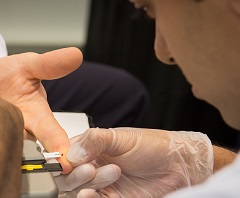By: Cathy Polley, RPh, Vice President, Health & Wellness, FMI & Executive Director, FMI Foundation 
What does your doctor’s office look like? Where did you receive your most recent flu shot? Ten years ago there wouldn’t be much variability in the way Americans answered these questions, but that’s not true for today’s health care consumer.
The way we consume health care in the United States is changing at a rapid pace. With pharmacies, supermarkets and other mass retailers entering the health care market, an increasing number of consumers are taking advantage of the convenience of retail health care locations for nutritional counseling and basic medical care. While the prevalence and usage of these clinics is increasing, retail health care centers have critical obstacles to overcome:
- Consumers are more willing to seek services from retail clinics that are run in partnership with local hospitals or health care providers;
- Consumers are unaware of the availability or services provided by their local retail clinic;
- Consumers are more willing to take advantage of the retail clinic if the cost of services provided are less than that of alternatives;
- Consumers see less value in traditional health care services delivered at retail clinics.
Retailers are answering this call by partnering with traditional health care providers. For example, SpartanNash’s Point of Care testing pilot program is administered throughout the state of Michigan under a study promoted by the University of Nebraska, Omaha. In this model, SpartanNash signed a collaborative practice agreement with a board certified physician to develop protocol for rapid influenza, rapid strep testing and pharmacotherapeutic treatment in the event of a positive test. The physician developed and approved protocol is then implemented at retail by SpartanNash pharmacists. Michigan consumers can trust in the knowledge that the attending pharmacist is adhering to a physician prescribed treatment and care plan, while deriving the cost and time saving benefits of retail delivered health care.


 Industry Topics address your specific area of expertise with resources, reports, events and more.
Industry Topics address your specific area of expertise with resources, reports, events and more.
 Our Research covers consumer behavior and retail operation benchmarks so you can make informed business decisions.
Our Research covers consumer behavior and retail operation benchmarks so you can make informed business decisions.
 Events and Education including online and in-person help you advance your food retail career.
Events and Education including online and in-person help you advance your food retail career.
 Food Safety training, resources and guidance that help you create a company food safety culture.
Food Safety training, resources and guidance that help you create a company food safety culture.
 Government Affairs work — federal and state — on the latest food industry policy, regulatory and legislative issues.
Government Affairs work — federal and state — on the latest food industry policy, regulatory and legislative issues.
 Get Involved. From industry awards to newsletters and committees, these resources help you take advantage of your membership.
Get Involved. From industry awards to newsletters and committees, these resources help you take advantage of your membership.
 Best practices, guidance documents, infographics, signage and more for the food industry on the COVID-19 pandemic.
Best practices, guidance documents, infographics, signage and more for the food industry on the COVID-19 pandemic.
